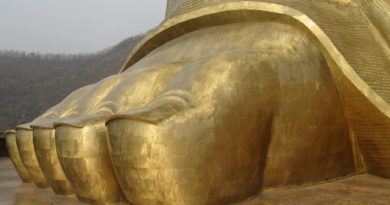Why Saint Jerome Dumped the VEGAN Gospel according to Matthew. By Chapman Chen
Summary: Saint Jerome (342 – 420 AD), upon Pope Damasus’ commission, produced in 383 a standard Latin version of the Four Gospels — the Vulgate. Jerome had a copy of the vegan Gospel according to Matthew, which he translated into Latin and Greek (Jerome, On Famous Men 2, de Santos 17).
Jerome knew that the vegan Hebrew Gospel according to Matthew was the sole original; he also knew that Jesus required people to be vegan (Jerome, “Against Jovinianus”, in NPNF2[6]:360). But Jerome failed to use the vegan Hebrew Gospel in his Vulgate because, applying Andre Lefevere’s (1992) conception of patronage, Jerome had to defer to the meat-eating preference of the State Church and the Roman ruling class.
Throughout history, religious and political authorities have flexed their muscles by abusing underprivileged minorities, notably, women, children, homosexuals, slaves, and animals (cf. Hobgood 2010). Among these categories, animalia is the most helpless one.
Let’s pray to God that this lost Gospel reemerge, for the Vulgate has caused hundreds of thousands of Christians to stray away from Jesus’ vegan teachings and trillions of innocent sentient beings (animals) to be brutally murdered every year.
____________________________________________________________________
Jerome Given Mission Impossible!
Saint Jerome (Eusebius Sophronius Hieronymus; 342 – 420 AD), a Catholic priest, translator, and theologian, was commissioned by Pope Damasus in 382 AD to produce a standard Latin version of the Four Gospels from the Old Latin Translation, Vetus Latina, numerous other Latin texts, and Greek manuscripts. By the time of Damasus’ death in 383, Jerome had completed the task. Subsequently, he on his own translated the rest of the Bible into Latin. His translation became known as the Vulgate.
In his Preface to the Four Gospels Addressed to Pope Damasus (hitherto abbrev. “Preface”), Jerome (383) wrote that the Pope urged him “to revise the old Latin version,” based on “the copies of the Scriptures which are now scattered throughout the whole world” and “there are almost as many forms of texts as there are copies” (Note 1). According to Wamrage (2014), from the 2nd to the 13th Centuries, the New Testament exists in no less than 800 manuscripts of the gospels; “4680 Greek manuscripts of the New Testament are known, of which no two have the same text”. “There is no single manuscript that would agree with the others. Theologians count 50,000 to 100,000 variations” (Gurry 2015).
Jerome Possessed a Copy of the Gospel according to Matthew
Jerome (415) wrote in Against the Pelagians (Note 2) that “the Gospel according to the Hebrews … is written in the Chaldee and Syrian language, but in Hebrew characters, and is used by the Nazarenes to this day (I mean the Gospel according to the Apostles, or, as is generally maintained, the Gospel according to Matthew, a copy of which is in the library at Caesarea)”.
Further, Jerome stated in Dialogus contra Pelagianos (Note 3):
“Matthew, who is also Levi, the ex-publican apostle, first composed in Hebraic letters the gospel of Christ in Judea…this Hebraic [text] is held even until today in the Caesarean library which Pamphilus the martyr studiously put together. There was an opportunity for me from the Nazaraeans to copy this volume, which is used in Beroea, a city of Syria. In which [gospel] it must be noted that, wherever the evangelist, whether from his own person or from the Lord and savior, makes use of testimonies of the old scriptures, he does not follow the authority of the seventy translators, but the Hebrew.”
Jerome had Translated the Gospel according to Matthew
Even before starting to prepare the Vulgate, Jerome had translated the Gospel according to Matthew into Latina and Greek: “the gospel which is named according to the Hebrews… was recently translated by me into Greek and Latin” (Jerome, On Famous Men 2, de Santos 17) (Note 4).
Jerome Knew the Gospel according to Matthew was the Sole Original:
In “Preface,” Jerome asserted, “the New Testament… was undoubtedly composed in Greek, with the exception of the work of Matthew the Apostle, who was the first to commit to writing the Gospel of Christ, and who published his work in Judæa in Hebrew characters.”
Also, as aforesaid, Jerome confirmed in On Famous Men 3, de Santos 18, that “Matthew…the…apostle, first composed in Hebraic letters the gospel of Christ in Judea…this Hebraic [text] is held even until today in the Caesarean library … There was an opportunity for me from the Nazaraeans to copy this volume“.
Jerome Failed to Include the Gospel according to Matthew in his Vulgate
In “Preface”, as aforementioned, Jerome wrote that he revised the four Gospels by a comparison of the Greek manuscripts only, although he was aware that “Matthew the Apostle… was the first to commit to writing the Gospel of Christ, and.. published his work in Judea in Hebrew”:
“I therefore promise in this short Preface the four Gospels only, which are to be taken in the following order, Matthew, Mark, Luke, John, as they have been revised by a comparison of the Greek manuscripts. Only early ones have been used. But to avoid any great divergences from the Latin which we are accustomed to read, I have used my pen with some restraint“.
The Gospel according to Mattew is vegan on account of the following reasoning.
The Ebionites Used only The Gospel according to Matthew
Irenaeus stated that the Ebionites used the Gospel according to Matthew (also known as Gospel of the Hebrews) exclusively (Irenaeus, Haer 1.26.2) . Eusebius of Caesarea wrote that they used only the Gospel of the Hebrews (Eusebius of Caesarea, Church History, III, 27, 4). James R. Edwards and Bodley’s Librarian Edward Nicholson argue that there was only one Hebrew gospel in circulation, Matthew’s Gospel of the Hebrews. They also note that the title Gospel of the Ebionites was never used by anyone in the early church. Epiphanius contended that the gospel of the Ebionites used was written by Matthew and called the “Gospel of the Hebrews”. [Epiphanius, Panarion 30.3.7]
The Ebionites were the First and True Church Founded by Jesus
In the Sermon on the Mount, Jesus said, “Blessed are you who are poor, for yours is the kingdom of God” (Luke 6:20 NIV). “The poor” here could not have referred to anyone who is poor, for the simple reason that not all poor people are righteous people. The “poor” in Hebrew is “אביונים Ebionim” and this is probably the origin of the name of the Ebionites (cf. Shaw n.d.)
In fact, according to the early church priest Father Eusebius, “The…Ebionites… used only the…Gospel according to the Hebrews … they received the name of Ebionites… For this is the name by which a poor man is called among the Hebrews (Eusebius, Ecclesiastical History, Book III 27:1-6) (Note 5).
The first disciples and followers of Jesus Christ were Ebionites in the sense that they gave up all luxuries, shared all necessities, and led an ascetic, spiritual, vegan life. For example, when a rich man asked Jesus how to inherit eternal life, Jesus told him to sell all his properties and follow Him. The rich man sadly walked away, and Jesus told His disciples that it’s more difficult for a rich man to enter the Kingdom than for a camel to go through the eye of a needle (Mark 17-25).
According to Jacob A. Shaw (n.d.), “At the time of Jesus and James, the Jerusalem church used different names as spiritual designations for themselves; they were seen as the Ebionites as well as the Nazarenes”. And according to Circle of the Free Spirit (2013), there are proofs that the Nazoreans were a movement within Judaism to which John the Baptist and Jesus pertained, and which was a movement of and for “the Poor”. In the first few centuries, there were Jewish Christian groups who named themselves Nazoreans and Ebionim, or Ebionites. They were denounced as “heretics” by the newly-forming Roman church, but they claimed to be true to the original teachings and movement which Jesus and John the Baptist founded.
The Ebionites/First Disciples of Christ were All Vegan
The first Christians, also known as Ebionites or Nazoreans, were all vegan/vegetarian (cf. James Bean 2013):
Peter said, “I live on olives and bread, to which I rarely only add vegetables.” (Clementine Homilies 12,6; also see, Recognitions 7,6)
“And happiness is found in the practice of virtue. Accordingly, the Apostle Matthew partook of seeds, and nuts, hard-shelled fruits, and vegetables, without flesh.” (Clement of Alexandria, The Instructor, Book 2, Chapter 1)
“John never ate meat.” (Church historian Hegesippus according to Eusebius, History of the Church II 2:3)
“James, the brother of the Lord, lived on seeds and plants and touched neither meat nor wine.” (Hegesippus , Epistulae ad Faustum XXII, 3)
“James, the brother of the Lord was holy from his mother’s womb; and he drank no wine nor strong drink, nor did he eat flesh.” (Hegesippus, quoted in The Church History of Eusebius, book 2, chapter 23) (Note 6).
The Gospel of Ebionites is Vegan/Vegetarian
The Gospel of Ebionites – as reported by Epiphanius – presents a vegetarian version of the gospels. It begins with John the Baptist; in it, John the Baptist does not eat locusts, but pancakes instead:
And so John was baptizing, and Pharisees came out to him and were baptized, as was all of Jerusalem.. his food was wild honey that tasted like manna, like a cake cooked in olive oil (Epiphanius, Panarion 30.13.4-5, trans. Ehrman and Plese, Apocryphal Gospels, 213).
Next, in the Gospel of the Ebionites, Jesus is virulently anti-sacrifice:
“I have come to destroy the sacrifices. And if you do not stop making sacrifice, God’s wrath will not stop afflicting you.”(Epiphanius, Panarion 30.16.4-5, trans. Ehrman and Plese, Apocryphal Gospels, 215)
Finally, Jesus’ veganism is also established when he refuses to eat the Passover lamb. Whereas the other gospels simply omit whether Jesus ate lamb, here Jesus directly opposes eating animals. Epiphanius writes:
For they [Ebionites] had the disciples say, “Where do you want us to make preparations for you to eat the Passover lamb?” And they made him respond, “ I have no desire to eat the meat of this Passover lamb with you.” (Epiphanius, Pan. 30.22.4, trans., Ehrman and Plese, Apocryphal Gospels, 215)
Since the vegan Ebionites used only the Gospel according to the Hebrews, the vegan Gospel of Ebionites, by definition, must be the Gospel according to the Hebrews, and the latter must also be vegan.
Corroborating Evidence that the Gospel of the Ebionites was Vegan:
According to James Bean (2013), the Clementine Homilies and the Recognitions of Clement are the largest surviving collection of Ebionite scriptures, and both condemn meat-eating and animal sacrifice.
For example, the Book of Homilies 7.4 warns us “not to taste dead flesh”:
And the things which are well-pleasing to God are these: to pray to Him, to ask from Him…to abstain from the table of devils, not to taste dead flesh, not to touch blood… (Note 7)
Homilies 3.45 states that God does not want animals killed at all:
But that He is not pleased with sacrifices, is shown by this, that those who lusted after flesh were slain as soon as they tasted it, and were consigned to a tomb, so that it was called the grave of lusts. He then who at the first was displeased with the slaughtering of animals, not wishing them to be slain, did not ordain sacrifices as desiring them; nor from the beginning did He require them. (Note 8)
The author of the Book of Revelation in the New Testament also denounced this practice: “I have a few things against you: There are some among you who hold to the teaching of Balaam, who taught Balak to entice the Israelites to sin so that they ate food sacrificed to idols…” (Revelation 2:14 NIV)
Jerome was Convinced that Jesus Wanted us to be Vegan
Not only did Jerome possess and translate the vegan Gospel according to Matthew (Gospel of the Ebionites), but he was also convinced that Jesus did not allow us to eat flesh:
“He raises the objection that when God gave his second blessing, permission was granted to eat flesh, which had not in the first benediction been allowed. He should know that just as divorce according to the Saviour’s word was not permitted from the beginning, but on account of the hardness of our heart was a concession of Moses to the human race, so too the eating of flesh was unknown until the deluge. But after the deluge, like the quails given in the desert to the murmuring people, the poison of flesh-meat was offered to our teeth. The Apostle writing to the Ephesians teaches that God had purposed in the fullness of time to sum up and renew in Christ Jesus all things which are in heaven and in earth. Whence also the Saviour himself in the Revelation of John says, “I am Alpha and Omega, the beginning and the ending.” At the beginning of the human race we neither ate flesh, nor gave bills of divorce, nor suffered circumcision for a sign. Thus we reached the deluge. But after the deluge, together with the giving of the law which no one could fulfill, flesh was given for food, and divorce was allowed to hard-hearted men, and the knife of circumcision was applied, as though the hand of God had fashioned us with something superfluous. But once Christ has come in the end of time, and Omega passed into Alpha and turned the end into the beginning, we are no longer allowed divorce, nor are we circumcised, nor do we eat flesh, for the Apostle says, “It is good not to eat flesh, nor to drink wine.” For wine as well as flesh was consecrated after the deluge,” (St. Jerome, “Against Jovinianus” in NPNF2(6):360) (Note 9).
Jerome Healed a Lion
Jerome was thus most probably a vegan, who was kind to animals.
According to the Golden Legend, a lion came limping into the monastery where Jerome came to pray. The other monks fled in terror but he treated the lion kindly, removing a thorn from its paw and having it washed and bandaged. The lion was tamed and lived among the monks, looking after the donkey who carried their wood, and guarding it when it went out into the fields.
______________________________________________________________
WHY then did Jerome not use in his Vulgate the vegan Gospel according to Matthew, which was probably the oldest gospel available in his time?
All Translation is Rewriting Governed by Patronage…
Now, according to the late translation theorist Prof. André Lefevere (1992), all translation is rewriting and/or manipulation, governed by the patronage, ideology and poetics of the translator. Jerome’s patronage individual-wise was Pope Damasus, government-wise was the Roman Empire, publisher-wise was Vatican, audience-wise was Roman aristocrats and wealthy merchants. As the mainstream Church, the government and the rich Romans in general were carnivorous, Jerome could only forsake the vegan Gospel according to Matthew in his translation.
In “Preface”, Jerome stated clearly that it’s Pope Damasus who ordered him “to sit in judgment on the copies of the Scriptures which are now scattered throughout the whol world”. And in the same Preface, Jerome admitted that “to avoid any great divergences from the Latin which we are accustomed to read, I have used my pen with some restraint“.
Also, “Is there a man, learned or unlearned, who will not, when he takes the volume into his hands, and perceives that what he reads does not suit his settled tastes, break out immediately into violent language, and call me a forger.” Jerome was worried that if he did not defer to the poetics ideology and taste of his compatriots, he would run into great trouble.
Jerome’d have had to Fear for his Life
As a matter of fact, as pointed out by Carsten Strehlow (2000:49, 55), “The Church Father Hieronymus [Jerome] was even driven from Rome because of his clear statements concerning vegetarianism and abstinence from alcohol.” (According to Orthodox Wiki, having maintained a monastic lifestyle, his criticisms of the secular clergy led to increased hostility from the clergy and their supporters With the death of Pope Damasus on December 10, 384, he lost his protection and so returned to Antioch in 385. [Note 10]).
Thus, according to Wamrage (2014), Jerome “really would have had to fear for his life if he had truthfully included Jesus’ love for the animals in his new translation of the Bible into Latin. Already under Emperor Constantine I, vegetarian and pacifist Christians had had liquid lead poured down their throats”.
Authorities Flex Muscles by Abusing the Helpless
Throughout history, the mainstream church, be it Catholic or Protestant, has endeavored to build up its power, consolidate its power, and manifest its power by way of oppressing, trampling upon, and exploiting underprivileged minorities, notably, women, children, homosexuals, slaves, and animals (cf. Laura Hobgood 2010). Among these categories, animals are the most helpless, downtrodden and tragic one. Trillions of innocent animals are imprisoned, tortured, raped, abused, and brutally slaughtered on a yearly basis. Holocausts occur regularly to them.
Paul Falsifying Jesus’ Vegan Teachings
This all began with the carnivorous Roman citizen St. Paul falsifying Jesus’ vegan teachings into a meat-eating religion in order to attract meat-eating rich gentiles, particularly Roman aristocrats and bourgeoisie (cf. James Bean 2013; Chen 2020; Chen 2021).
Splitting of Jesus’ Church
After Jesus’ ascension, His church split up into two camps:- vegan Jewish Christianity as led by James the Just (Jesus’ natural brother), aided by Peter, etc.; and meat-eating Gentile Christianity as led by Paul. And there were intense power struggles between the two camps (cf. Bean 2013).
According to Keith Akers’ (2013) Disciples, Jesus and his Jewish disciples belonged to Jewish Christianity (the Essenes, the Nazoreans and the Ebionites), advocating vegetarianism, and opposing animal sacrifice. Jesus cleansed the Holy Temple and offended Jewish leaders, leading to his death, exactly because he could not tolerate hawkers selling livestock for sacrifice.
On the other hand, Paul told people that they could “eat anything sold in the meat market without raising questions of conscience” (I Corinthians 10:25 NIV). This is for two reasons. Firstly, as a Roman, Paul himself liked to eat meat, as he openly admitted: “If I can thank God for the food [meat offered to an idol] and enjoy it, why should I be condemned for eating it? (1 Cor. 10:30 NLT). Secondly, the rich and powerful of the Roman Empire ate meat; Paul dropped the vegan dietary requirement of Jesus’ original church in order to attract upper-class Romans (cf. Bean 2013).
However, because veggie Jewish Christianity was still in power in the church, Paul diplomatically advised believers not to cause brothers to stumble over the issue of meat-eating (Romans 14:21), although he disparaged those Christians who “eat only vegetables” claiming that their “faith is weak” (Romans 14:1-2 NIV). The fact that Paul had to make these points means that ethical veganism was a significant requirement to be a Christian in those days (cf. Pasha 2009)!
While Paul argues that eating meat offered to an idol is not immoral, because “an idol is nothing at all” (I Cor. 8:4 NIV) and “To the pure, all things are pure” (Titus 1:15 NIV), Jesus in the letter to the church of Thyatira rebukes them for tolerating a prophetess who “seduce[s] my servants to … eat things sacrificed unto idols” (Revelation 2:20 KJV). And The Jerusalem Council led by James the Just, Jesus’ natural brother, wrote to Gentile converts the Council’s “decision that they should abstain from food sacrificed to idols, from blood, from the meat of strangled animals” (Acts 21:25 NIV).
One Thing Paul Never Dared to Say
Among all these wrestlings, there’s one thing which one would have expected Paul to say, but which he never dared to say, i.e., “Since our Lord ate meat, there should be no problem about His followers doing so” (Linzey 2009). The reason why Paul never made this statement was probably because “Jesus didn’t eat meat” and “at the time Paul wrote, there were many people alive who had known the earthly Jesus” (Akers 2000).
When James the Just was murdered in 62 AD, Paul revealed his true features and “delivered unto Satan” at least two advocates of veganism, namely Hymenaeus, Philetus (1 Timothy 1:20 KJV). According to Ellicott’s Commentary for English Readers, “delivered unto Satan” involves either corporal punishment or excommunication or execution.
The vegan Jewish Christian community suffered a further blow when the Roman legions destroyed Jerusalem in 70 AD. Paul’s meat-eating gentile Christian camp then took over power in the church.
Constantine’s Meat-eating Version of the Bible
Nonetheless, a lot of early Church priests remained vegan until the 4th century. Steven Rosen (1987) argues in his book, Food for the Spirit:
The early Christian fathers adhered to a meatless regime…many early Christian groups supported the meatless way of life. In fact, the writings of the early Church indicate that meat eating was not officially allowed until the 4th century, when the Emperor Constantine decided that his version of Christianity would be the version for everyone. A meat eating interpretation of the Bible became the official creed of the Roman Empire, and vegetarian Christians had to practice in secret or risk being put to death for heresy. It is said that Constantine used to pour molten lead down the their throats if they were captured.
Did Jesus foresee his loyal followers becoming heretics in his own church?
Pic credit: Niccolo Antonio Colantonio, “Jerome in his Study,” c. 1440-1470, Public Domain, National Museum of Capodimonte
Original article link: https://www.hkbnews.net/post/why-saint-jerome-dumped-the-vegan-gospel-according-to-matthew-by-chapman-chen-hkbnews Amen!
Notes:
1. http://www.newadvent.org/fathers/3002.htm
2. Ch. 3.2 Dialogus contra Pelagianos. – 415 AD, trans. William Henry Fremantle https://www.ccel.org/ccel/schaff/npnf206.vi.ix.III.html
3. Jerome, On Famous Men 3, de Santos 18 http://www.textexcavation.com/jewishgospels.html
4. http://www.textexcavation.com/jewishgospels.hvtml
5. http://www.newadvent.org/fathers/250103.htm
6. http://www.godsdirectcontact.org.tw/eng/news/210/ve_38.htm
7. https://www.newadvent.org/fathers/080807.htm
8. https://www.newadvent.org/fathers/080803.htm
9. http://www.documentacatholicaomnia.eu/03d/1819-1893,_Schaff._Philip,_3_Vol_06_Jerome,_EN.pdf
10. https://orthodoxwiki.org/Jerome
References
Akers, Keith (2013). Disciples: How Jewish Christianity Shaped Jesus and Shattered the Church. California: Apocryphile Press.
Bean, James (2013). “Uncovering a Vegetarian Jesus at the Beginning of Christianity”. Medium. com, March 31. (https://medium.com/sant-mat-meditation-and-spirituality/uncovering-a-vegetarian-jesus-at-the-beginning-of-christianity-9279741be7c4)
Chen, Chapman (2020). “Proofs that Jesus was Vegan.” HKBNews, Dec. 28 (https://www.hkbnews.net/post/proofs-that-jesus-was-vegan-%E6%85%88%E6%84%9B%E8%80%B6%E7%A9%8C%E9%A3%9F%E5%85%A8%E7%B4%A0-by-chapman-chen-hkbnews )
Chen, Chapman (2021). “How St. Paul Perverted Jesus’ VEGAN Teachings.” HKBNews, Dec. 31
(https://www.hkbnews.net/post/how-st-paul-perverted-jesus-vegan-teachings-by-chapman-chen-hkbnews)
Circle of the Free Spirit (2013). “Homily for December 29, 2013 – Feast of the Holy Family”. Circle of the Free Spirit. Org, Dec. 29. (http://circleofthefreespirit.org/lgc-2.html)
Gurry, Peter (2015). “The Number of Variants in the Greek New Testament: A Proposed Estimate.” Cambridge UP, Nov. 20. (https://core.ac.uk/download/pdf/77409535.pdf)
Hobgood, Laura (2010). The Friends we Keep: Unleashing Christianity’s Compassion for Animals. Waco, TX: Baylor University Press.
Jerome (1892). NPNF2-06. Jerome: The Principal Works of St. Jerome. Ed. St. Schaff, Philip. Trans. Freemantle, M.A. MI: Grand Rapids, Christian Classics Ethereal Library. (http://www.ccel.org/ccel/schaff/npnf206.html)
Lefevere, André (1992). Translation, Rewriting, and the Manipulation of Literary Fame. Milton Park: Routledge.
Linzey, Andrew (2009). Creatures of the Same God — Explorations in Animal Theology. NY: Lantern Books.
Pasha, Kamran (2009). “Was Jesus a Vegetarian?” Huffpost, Nov. 17. (https://www.huffpost.com/entry/was-jesus-a-vegetarian_b_276141)
Rosen, Steven (1987). Food for the Spirit: Gaborone: Bala Books.
Shaw, Jacob A. (n.d.). “Jesus was a Vegetarian.” All Creatures.Org (https://www.all-creatures.org/articles/an-tpr-shaw.html)
Wamrage (2014). “The Bible is falsified”. Scrid, April 9. (https://www.scribd.com/document/217222957/The-Bible-is-Falsified)
-------------------------------------------------支持《多聞》眾籌計劃,我們目標是集資12萬加元,這筆錢遠不夠在報紙買頭版,但可支持《多聞》抗共2年!
Bank interact 課金給《多聞》:tohk928@gmail.com
Subscribe us in:
Telegram Channel:
https://t.me/tohknews
Facebook:
https://www.facebook.com/多聞-117598966317804
Twitter:
https://twitter.com/TOHKNEWS
Reddit:
https://www.reddit.com/user/TOHKnews
Share this article to:




